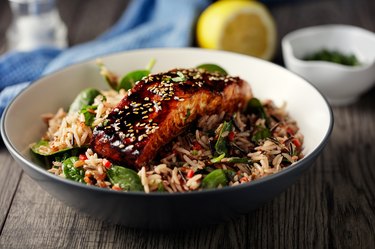
After consuming foods that contain carbohydrates, it's normal to see a rise in blood sugar levels.
Your blood sugar, also known as blood glucose, will temporarily go up after eating a meal until your body's insulin is able remove the extra sugar from the bloodstream. In general, blood sugar "peaks 90 minutes after you consume a meal," says Erin Palinski-Wade, RD, CDE, author of 2-Day Diabetes Diet. "But it's going to vary based on what you ate."
Video of the Day
Video of the Day
This type of peak is a normal part of digestion. Sometimes, however, a person's body does not respond as it should, and blood sugar levels rise too high. When this happens, it can indicate a risk for prediabetes or diabetes. Frequent spikes in blood sugar can lead to additional long-term medical problems, as well. Here's what you can do (and how you may want to change your diet) to protect your health.
Read more: How to Lower Blood Sugar Levels Fast
What Causes Post-Meal Blood Sugar Peaks?
Two types of carbs — sugars and starches — are primarily responsible for increasing your blood sugar. After you eat these carbs, digestive enzymes break them down into simple sugars, which are absorbed into your bloodstream. The pancreas responds to the influx of sugar by releasing insulin, which returns sugar levels back to normal, according to the American Diabetes Association (ADA).
Your blood sugar peaks about 90 minutes after eating a meal, says Palinski-Wade. It can peak faster if you only consumed quickly digested carbs, such as hard candy or juice, she says, but after a balanced meal containing protein, fat and fiber, blood sugar peaks between one to two hours after eating. Within a few hours after a meal, your blood sugar should drop back down.
Portion sizes, the type of foods in your meal and when you eat can all influence how high and how quickly your blood sugar peaks. Carbohydrates that do not contain fiber, such as foods made from processed white flour and white rice, cause higher blood sugar levels, and high-carb beverages, such as sugar-sweetened drinks, can have a significant effect on glucose levels. Bigger portions of carbs can also cause larger blood sugar spikes.
People without diabetes don't need to measure their blood sugar levels. But for those keeping track, normal blood sugar two hours after eating should be less than 140 milligrams per deciliter (mg/dL), according to the ADA. For people with diabetes, a normal blood sugar level a few hours after eating should typically be less than 180 mg/dL, according to the ADA, though that number can vary from person to person.
Read more: Do Oranges Raise Your Blood Sugar?
Glycemic Index Guidelines
Wondering which foods are most likely to spike your blood sugar levels? To find out the answer, some people reference the glycemic index, a rating system that's used to show the effect of carb-containing foods on blood sugar.
On the glycemic index, carbs are assigned a score from zero to 100. At the high end, 100 represents a significant spike caused by glucose. Scores of 70 to 100 indicate high-glycemic foods. A score of 55 or less goes to low-glycemic foods. Scores falling between these two groups have a moderate effect, according to the Mayo Clinic. While your blood sugar will still peak within a general timeframe after eating, low-glycemic foods ensure that the peak is not too large.
But you don't have to rely solely on the glycemic index if you want to know how a food will affect your blood sugar levels, says Palinski-Wade. While the tool can be useful, it also has some flaws: "It can be confusing," she says. "[In this system,] watermelon has a higher glycemic index range than a can of regular cola." In general, you're better off monitoring your portion sizes and carb and fiber intake than relying on the glycemic index, says Palinski-Wade.
The Effects of Protein and Fat
The rate at which food leaves your stomach, called gastric emptying, affects the amount of sugar in your blood after you eat. Protein and fat both slow down gastric emptying, which helps keep blood sugar lower shortly after a meal. In a study published in 2016 in the journal Diabetologica, people who ate high protein-foods (fish or meat) before eating carbohydrates (rice), experienced a rise in glucagon, which is thought to play a role in slowing down gastric emptying.
Plus, says Palinski-Wade, "if you're eating a meal that has a large amount of fat or protein, the fat, the protein or the fiber will slow down the absorption and conversion of the sugar, so the peak might be a bit delayed." She suggests eating carbs with at least one good source of fiber, protein or fat. "Not only is it going to help with the release of blood sugar," she says, "but it's also going to help keep you more satisfied."
- American Diabetes Association: "Blood Sugar and Insulin at Work"
- Harvard Health Publishing: "Glycemic Index for 60+ Foods"
- Mayo Clinic: "Glycemic Index Diet: What's Behind the Claims"
- Diabetologia: "Meal Sequence and Glucose Excursion, Gastric Emptying and Incretin Secretion in Type 2 Diabetes: A Randomised, Controlled Crossover, Exploratory Trial"
- American Diabetes Association: "Diagnosis"
Is this an emergency? If you are experiencing serious medical symptoms, please see the National Library of Medicine’s list of signs you need emergency medical attention or call 911.